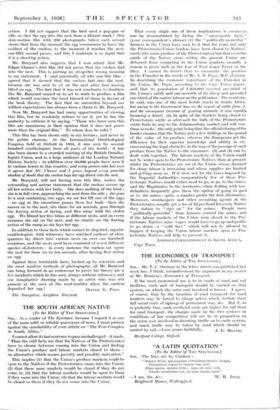THE SOUTH AFRICAN NATIVE
[To the Editor of THE SPECTATOR.] Siai—As a reader of The- Spectator, because I regard it as one of the more solid or reliable purveyors of news, I must protest against the unreliability of your article on " The Fear Complex in South Africa."
I cannot allow its last sentence to pass unchallenged—it reads, " Thus the cold facts are that the Natives of the Protectorates have to choose between coming into the Union and finding, the Union's produce and labour markets closed to them— an alternative which means poverty and possibly starvation."
This implies (I) that the Union's produce markets could be open to the Natives if the Protectorates came into the Union, (2) that these same markets would be closed if they; do not come in, (3) that the labour markets would be open to them if they came into the Union, (4) that the labour markets would be closed to them if they do not come into the Union. That every single one of these implications is erroneous can be demonstrated by facing the " uneseapable facts " (your correspondent's phrase) (1) the " politically-powerful " farmers in the Union have seen to it that for years not only the Protectorate-Union borders have been closed to Natives' cattle (the main produce of the Protectorates) but that even the cattle of the Native areas within the present Union are debarred from competing in the Union markets (usually a reason is given such as the fear of East Coast Fever or the like). I cannot do better than to summarise the position in the Franshei in the words of Mr. A. B. Payn, M.P. (Union). In describing the economic importance of the Franshei in the Union, Mr. Payn, according to the Cape Times report, said that its population of 1,200,000 covered one-third of the Union's cattle and one-seventh of its sheep and provided one-third of the native labour on the gold mines. The territory, he said, was one of the most fertile tracts in South Africa, but owing to the Government ban on the export of cattle from it, and the consequent increase of grazing animals, it was rapidly becoming a desert. (2) In spite of the borders being closed to Protectorate cattle as aforesaid the bulk of the Protectorate cattle finds its way to the Johannesburg market and will con- tinue so to do—the only point being that the official closing of the border ensures that the Native gets a few shillings in the pound of the value of his produce, whereas the Europeans get the difference for their superior knowledge and ability in cir- cumventing the legal obstacles in the way of the passage of such produce from the Native to the consumer. (3) and (4) can be dealt with together. The labour markets of the Union could not be wider open to the Protectorate Natives than at present whilst the Protectorates are out of the Union whose demand for cheap labour is increasing and whose supplies are limited and getting more so. If it were not for the taxes imposed by the Imperial Authorities comparatively few of these Pro- tectorate Natives would either need to go, or go, to the mines, and the Magistrates in the territories, when dealing with tax- defaulters, frequently give them the option of going to gaol or to the mines—quite a number prefer the first alternative. Moreover, storekeepers and other recruiting agents in the Protectorates usually get a fee of £2 per head for every Native they induce to " sign on " for the mines. People more " politically-powerful " than farmers control the mines, and if the labour markets of the Union were closed to the Pro- tectorate Natives mine wages would have to go up and profits to go down—a " cold fact " which will not be allowed to happen if keeping the Union labour markets open .to Pro- tectorate Natives will help to prevent it.
Cape Town.
ANOTHER CORRESPONDENT IN SOUTII AFRICA.






































 Previous page
Previous page